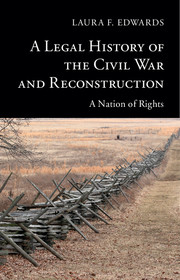“Black lives matter.” When spoken in law schools, these words have had a particular subtext. They expressed outrage at the lives taken in the name of the law, and despair at the distance between our legal ideals and the everyday legal encounters of people like Michael Brown, Eric Garner, and Freddie Gray. In the words of a statement signed by many of my UC Berkeley colleagues, law school communities “struggle to reconcile the constitutional values [taught] in the classroom with the reality that race determines how communities of color experience our legal system.”The full review is available here.
Helping our students make sense of this dissonance requires that we bring history into our teaching, and further, that we go beyond stock narratives about the evils of Jim Crow and the victories of the modern civil rights movement. High on my list of teaching aides, going forward, will be Laura F. Edwards’ A Legal History of the Civil War and Reconstruction. It offers both a concise overview of an important legal-historical moment and a bold argument. Reconstruction did more than “abolish slavery and bring Confederate states back into the Union,” Edwards explains; it “unsettled the nation’s entire legal order.” (P. 13.) The resulting legal changes encouraged all Americans—not just freed slaves—to see the world around them in terms of individual rights and to champion the value of equality. This is the very same vision that many entering law students carry with them today.
Embedded within this new legal order, however, were seeds of disappointment, resentment, and conflict. . . .
Saturday, August 1, 2015
Tani Reviews Edwards, "A Legal History of the Civil War and Reconstruction"
JOTWELL has just posted my admiring review of A Legal History of the Civil War and Reconstruction: A Nation of Rights (Cambridge University Press, 2015), by Laura F. Edwards (Duke University). Here's the first few paragraphs:
Labels:
Civil War,
Race,
Reproductive Rights,
Scholarship -- Books,
Slavery
